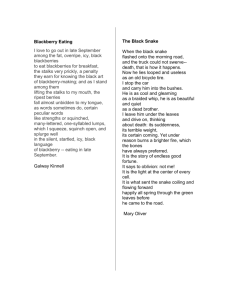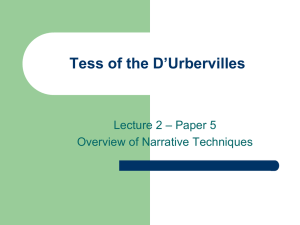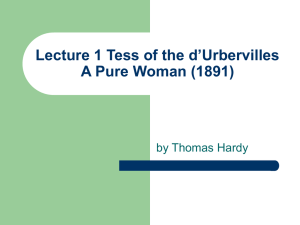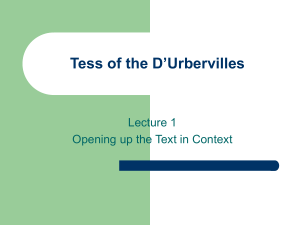TESS OF THE D`URBERVILLES ESSAY “VIOLATED AND
advertisement
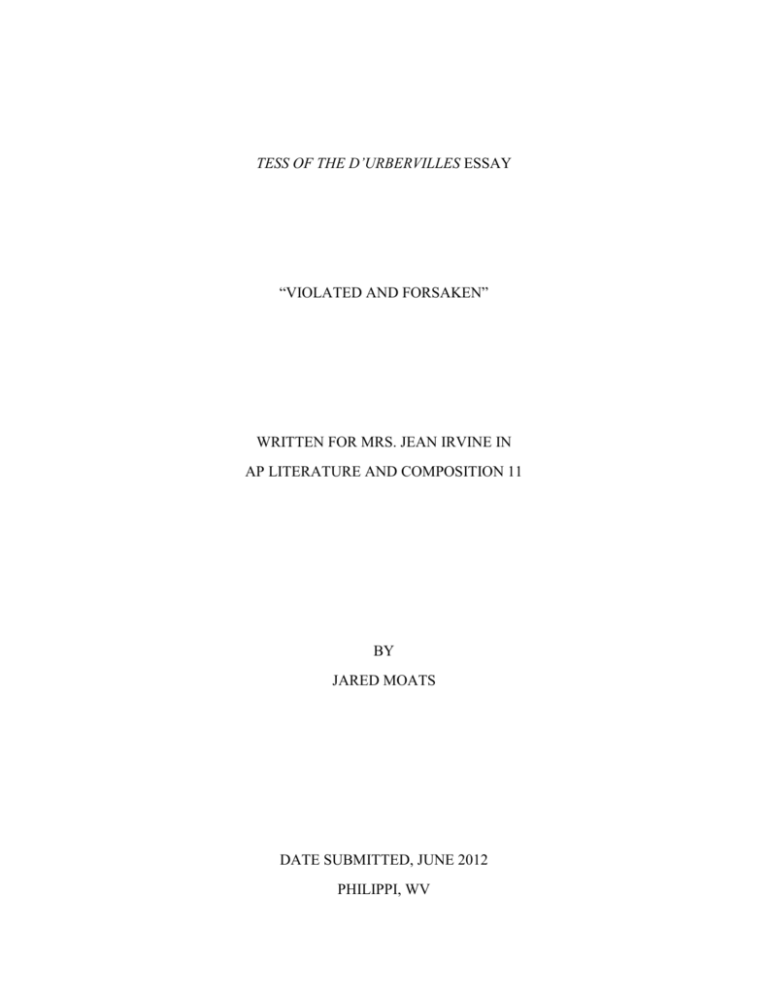
TESS OF THE D’URBERVILLES ESSAY “VIOLATED AND FORSAKEN” WRITTEN FOR MRS. JEAN IRVINE IN AP LITERATURE AND COMPOSITION 11 BY JARED MOATS DATE SUBMITTED, JUNE 2012 PHILIPPI, WV Thesis This paper intends to analyze the actions of the tragic character from Tom Hardy’s novel, Tess of the d’Urbervilles demonstrating how the character’s actions and their results contribute to the tragic meaning of the work as a whole. Summary In Thomas Hardy’s novel, Tess of the d’Urbervilles, the author reveals the cruelty of humans. The protagonist, Tess Durbeyfield is violated by one man and forsaken by another. Tragedy permeates the entire novel, but the tragic finale of the book is brought upon by one character: Alec d’Urberville. Alec’s horrible actions are directed toward Tess. Tess visits the d’Urberville household in order to claim kin with the family, but left with an armful of sin. D’Urberville takes Tess into an area that is unknown to her and leaves her by herself. He informs Tess of his intention to locate a landmark to discern their location. Alec ventures some distance from the carriage, and returns to find Tess sleeping. He rapes her while she is yet asleep. The rape sets the tragedy in motion. As a result, Tess conceives and births a child. This moment is important to the novel because before the child, Tess is viewed as a harmless juvenile, but now as a sinful fornicator. The birth of the baby brings shame upon Tess and her family, making this the first true tragedy seen in the novel. This event also negatively impacts other characters throughout the novel. 2 Even though Tess loves her baby with a passion only a mother can have, her love is short-lived. Tess’s baby becomes sick and she determines to find a way to prevent her child from facing eternal damnation before its inevitable death. Despite Tess’s attempts of healing the baby, it dies and she only hopes that her child is forgiven. As a result, misery roots itself within Tess and ensures that she leaves her home to work on a dairy farm where she meets Angel Clare, the love of her life. Tess is thoroughly surprised when Angel Clare starts courting her, and even more surprised when he proposes. Although the heroine loves him dearly, she will not marry him because she views herself as impure. Tess turns him down several times, but Clare doesn’t give up. In fact, Tess’s refusals strengthen his love and desire for her. As a consequence of Clare’s courting, Tess’s acquaintances mourn the fact that he will never love them. The pain is so great that Izz, Retty, and Marian brood over him in the presence of Tess. As a result of the three complaining, Tess decides that not only will she have him but neither will anyone else. Angel Clare and Tess Durbeyfield (Tess refused to take the name of d’Urberville unlike her father had) marry each other, and Tess becomes Mrs. Angel Clare. Joy inflates both of them, but this feeling is short-lived as well. When they settle into their temporary homestead, Angel Clare reveals that he wants forgiveness from Tess for sleeping with a woman for eight-and-forty hours. Tess promptly forgives him and proceeds to admit to being raped and having a child by Alec d’Urberville. This time Alec’s actions affect two people at once. Clare does not forgive Tess for something that was no worse than what Clare had taken part in. Angel had willingly partaken in 3 a sexual act; sex was forced upon Tess. Even though this is apparent, Angel refuses to forgive her and does not see her as his wife. After her admittance, Tess returns home to her parents and eventually works on a new farm while Angel goes to Brazil. Tess mourns for her husband while he is away. This is the most tortuous moment for Tess because of her separation from the man who despises her, but this man is the same person that she loves no matter what. While Tess is working on the farm, the antagonist reappears. Alec d’Urberville stumbles upon Tess in town while preaching his new found faith. D’Urberville assures Tess that he is changed, but he soon abandons his faith and claims it is because he loves her. Alec teases Tess by telling her that her husband will never return from Brazil to love her. As a result, the two marry each other. After Tess and Alec marry, d’Urberville’s prediction does not hold true. Angel Clare returns to England in hope of finding his wife and forgiving her. He discovers her at an old motel and finds that she is married to d’Urberville. Tess tells Clare to leave, but breaks down in her room. She immediately blames Alec for his prediction not being true and stabs him with a knife. His body is found dead upon the bed hours later. Tess finds Clare and their old love rekindles, but Tess is soon arrested. The novel ends with Angel Clare and Tess’s sister, ‘LizaLu, standing outside of a prison and witnessing a black flag being raised, which signals that an execution has just taken place. Analysis Above you will see a brief summary of the suffering that was brought upon Tess and other characters. After careful review, it is possible to see why Alec d’Urberville is the true 4 character who brings about the suffering of others. If Tess was not raped, there would be no humiliation causing her to leave her hometown in order to work at a dairy farm. She would not meet Angel Clare therefore, she would not kill Alec. Rape is delicately touched upon in the novel by the statement, “Doubtless some of Tess d'Urberville's mailed ancestors rollicking home from a fray had dealt the same measure even more ruthlessly towards peasant girls of their time.”1 By saying this we are given a brief glimpse of what is actually going on in this scene. During this part of the book, the word “rape” is never actually used, leaving the action open to our interpretation, but is confirmed with the aforementioned line. Hardy uses this same method during the book’s finale. In the final scene of the book, Hardy reveals the fate of the protagonist. He took the same approach as he did in the rape scene, and did not use the word “death” or “execution” anywhere during the finale. Instead, he used sentences like, “Against these far stretches of country rose, in front of the other city edifices, a large red-brick building, with level gray roofs, and rows of short barred windows bespeaking captivity [. . .] Upon the cornice of the tower a tall staff was fixed [. . .] A few minutes after the hour had struck something moved slowly up the staff, and extended itself upon the breeze. It was a black flag.”2 Here he tells that Clare and ‘Liza-Lu were standing in front of prison without actually revealing what the structure is. The black flag that rises is also a symbol of execution, which symbolizes the death of Tess. In conclusion, Alec d’Urberville is the true tragic figure of this book. Without his actions at the beginning, the events leading up to Tess’s execution and the execution itself would not Thomas Hardy. Tess of the d’Urbervilles. A Pure Woman Faithfully Presented. (Oxford: Oxford University Press, 1988), page 389. 1 Thomas Hardy. Tess of the d’Urbervilles. A Pure Woman Faithfully Presented. (Oxford: Oxford University Press, 1988), page 390. 2 5 happen. Even though Alec contributes to the tragic work as a whole, the true meaning can be summed up in a much more simple way. In the final paragraph of the novel, one sentence reveals the tragic meaning. Hardy states, “Justice was done, and the President of the Immortals, in Aeschylean phrase, had ended his sport with Tess.”3 This sentence reveals the theme of Hardy’s aim. In the ancient Greek tragedy Prometheus Bound, written by Aeschylean, Prometheus steals fire from the gods in order to better humanity, but the President of the Immortals punishes Prometheus with eternal pain as a consequence of his thievery.4 When Hardy references this he is symbolizing his feeling that Tess’s punishment was unjust and was decided by a higher being. In this case, humanity. Thomas Hardy. Tess of the d’Urbervilles. A Pure Woman Faithfully Presented. (Oxford: Oxford University Press, 1988), page 390. 3 4 Prometheus Bound written by Aeschlyean 6



